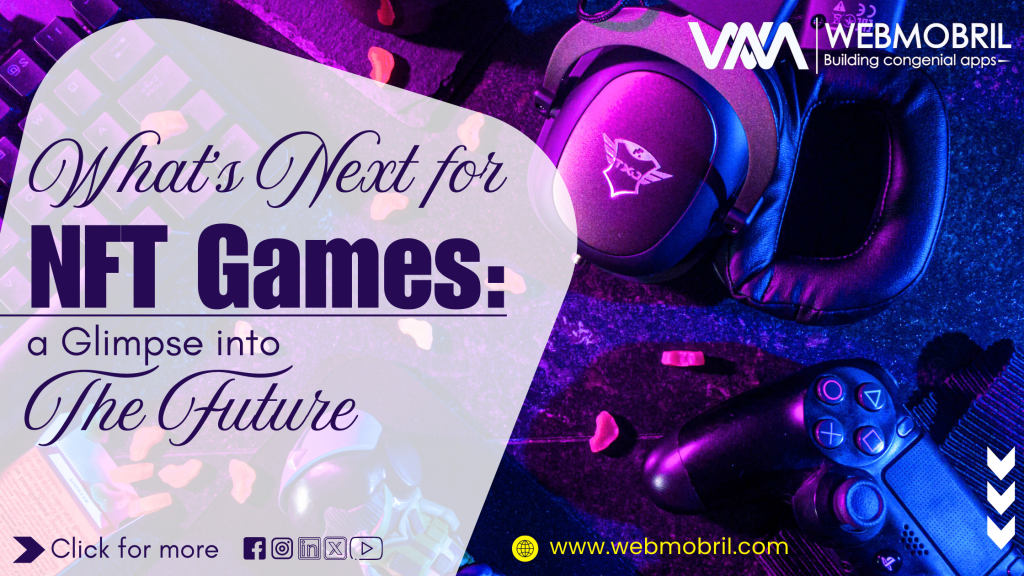The initial hype around NFTs (Non-Fungible Tokens) and their impact on gaming has faded. As technology advances, we are just starting to explore NFT games’ full potential. NFT games give players true ownership of in-game assets.
Game developers are placing greater emphasis on immersive experiences. They aim for players to feel a deep investment in their games. This involves crafting games that provide genuine value. A significant approach is enabling players to sell or trade their in-game assets. This shift aligns with the play-to-earn revolution, potentially creating innovative business models and new revenue streams. This adds a new perspective to gaming.
So, what lies ahead for NFT games? Let’s explore the trends shaping the future of NFT gaming. They could transform digital entertainment.
The Play-to-Earn Revolution: A New Era of Gaming
NFT gaming has transitioned from being a fun pastime to a legitimate way of earning while playing. Players are now more than just participants. They help create the in-game economy. Play-to-earn games let players earn valuable, tradable assets. They turn a hobby into a potential income source. As more games adopt this model, new opportunities will arise. Players will be able to engage and earn rewards. This will signal a major shift in the gaming landscape.
This transition toward player-driven economies brings with it certain technical challenges. NFT games must rely on strong blockchains. They need to handle large transactions and sustain play-to-earn ecosystems. This is where blockchain innovation becomes essential.
Blockchain Innovation: Scalability and Sustainability
NFT games must fix blockchain limits to scale. They need faster transactions and lower energy use. New blockchain networks aim to solve these issues. They seek to cut high transaction (or “gas”) fees and slow processing times. Layer 2 solutions are extra frameworks. They speed up transactions and cut costs. So are proof-of-stake consensus methods. They can make NFT games faster, cheaper, and greener. This would enhance accessibility, bringing NFT gaming to players and developers around the globe.
Interoperability: Connecting Game Worlds
A thrilling feature of NFT games is interoperability. It lets you transfer assets between different games and platforms. Imagine a unique sword in one game. You can also use it in another. Or own digital land that holds its value across different virtual worlds. This connectivity could create a vibrant, interconnected ecosystem. It would lead to a vast metaverse where games, economies, and virtual spaces converge.
Interoperable assets would create a gaming world beyond a single title. It would generate value beyond the limits of individual games. This evolution could be crucial for developing a cohesive metaverse, where player-owned assets hold significant value across multiple games.
AI Integration: The Future of Dynamic, Personalized Gameplay
As AI technology advances, NFT game development is set to provide fully personalized experiences. Imagine a game where both characters and NPCs adapt to players’ unique behaviors. They present new challenges based on individual performance. AI will facilitate adaptive, dynamic game worlds that change in real time, providing a more immersive and tailored gaming experience. By merging AI-driven features with NFTs, players can possess assets that add depth and significance, turning in-game interactions and transactions into unforgettable, personalized moments.
Social and Community-Driven Gaming: Building Together
NFT games are building vibrant communities. Players can influence the game’s development. Decentralized governance lets these communities shape game mechanics, asset distribution, and storylines. This approach promotes teamwork on projects that define in-game economies and assets. It offers a new way to play and earn together. Such interactions enhance the gaming experience and promote teamwork in the gaming realm. NFT game development thrives in this environment, allowing creators to innovate with player input.
Virtual Economies and Career Opportunities
NFT games are creating significant virtual economies that provide players with real-world value. Players can earn money in these games by trading NFTs and engaging in-game economies. NFT games could create new industries in a popular virtual world. They would support content creators, asset traders, and professional gamers. These digital economies may mirror the real world. They could give players financial independence and career opportunities within the game. As virtual economies thrive, NFT games will merge work, finance, and fun.
Conclusion
The future of NFT games is promising and rapidly advancing. Trends such as play-to-earn mechanics, interoperability, scalable blockchain technology, AI-driven experiences, and community collaboration are transforming how players engage within digital realms. NFT games are not only changing how people play but also redefining the roles of players and developers in the gaming landscape. We stand on the verge of a digital revolution where gaming provides unprecedented ownership, connectivity, and financial rewards.
WebMobril Inc. is a leader in NFT game development. We help businesses and developers create engaging, scalable, innovative NFT games. From blockchain integration and smart contracts to vibrant in-game economies, our team of experts ensures seamless integration and dynamic AI-driven game mechanics.
Are you ready to take the lead in the NFT gaming revolution? Connect with WebMobril Inc. today, and let’s turn your NFT game vision into reality. Join us in creating the next generation of NFT games that will enchant players around the globe!




